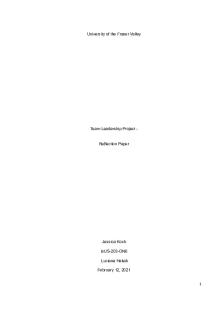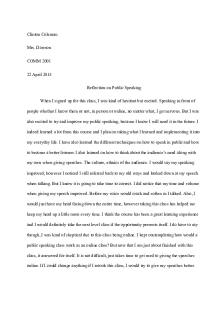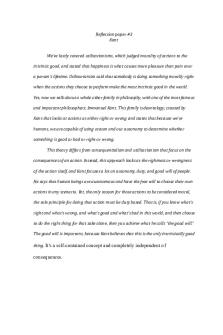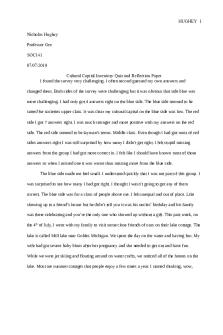Cultural Competency Reflection Paper PDF

| Title | Cultural Competency Reflection Paper |
|---|---|
| Course | Cultural Diversity |
| Institution | St. John's University |
| Pages | 5 |
| File Size | 61.4 KB |
| File Type | |
| Total Downloads | 78 |
| Total Views | 167 |
Summary
Download Cultural Competency Reflection Paper PDF
Description
Christina Masiakos CSD 381: Culture and Diversity Professor Mosquera-Valerio December 6th, 2020
Final Cultural Competency and Reflection Paper Cultural Competency is essential for Speech Language Pathologists and other healthcare professionals to appropriately assess and treat culturally and linguistically diverse individuals. Even though the world has evolved, and great strides have been made in society, these biases and stereotypes still exist. In order to eliminate and reduce cultural bias, it is important to self-reflect one’s own personal biases, and educate and expand their knowledge to become more understanding of one’s culture. An effective way to evaluate one’s cultural competence is by utilizing the Personal Reflection and the Service Delivery Cultural Competence Checklists. These checklists were developed to heighten awareness of how healthcare professionals view their clients/patients from culturally and linguistically diverse populations. These checklists are tools to ensure awareness one’s own beliefs, and how they might influence their own view of other cultures. Furthermore, it is important to be aware of these biases, because if we are not then we may act on our biases and stereotypes which can influence our behavior towards members of social groups and clinical decisions can also be effective that may include receiving services in school or simply giving food to a patient. This can cause malnutrition or not receiving proper care or treatment.
Recognizing that the self-biases exist is one of the most important strategies to take into consideration. When one does not acknowledge that this bias exists then no action can be taken to solve the problem. When a clinician acknowledges the problem, ultimately comes the acceptance of accountability and responsibility to make a difference as a healthcare professional. A clinician can implement several strategies that healthcare professionals can incorporate into their daily clinical routine. One of the most important strategies include, personal awareness, which is essential to prevent biases and stereotypes. By doing this, you can develop self-regulatory behaviors which can be controlled when interacting with individuals and when faced with a threat of unconscious bias, it forces the health professional to be self-aware and understand and become aware of how they are perceived by their patients. The first time I assessed myself cultural beliefs and biases on the checklists, my responses consisted of mostly scores of 1’s and 2’s. This revealed that I had some unconscious biases that I was unaware of. However, after the information that I learned in the last four months in this course and my own experience and research which I feel expanded my knowledge which was reflected on my responses the second time I assessed myself on the checklists. This shows that since the beginning of class, I have expanded my knowledge and done the proper research on educating myself on client’s/patients who come from culturally and linguistically diverse backgrounds. As a student clinician, I believe that I have grown and have become more aware of different backgrounds and cultures, especially with my experience at my medical
placement this past semester. Culture and religion played an immense role especially in the feeding and swallowing evaluation and treatments that we were delivering. For example, many patients were Kosher. This is important information to know because when doing swallowing/food trials and evaluations it important to be aware of the patient’s food and diet restrictions other than being what consistency they can tolerate. For example, Kosher diets consist of important rules. Meat and dairy may not be served together at the same meal. Furthermore, all utensils and equipment used to process, and clean meat and dairy products must be kept separate. We must deliver our treatment in the most successful and appropriate way possible while still remaining culturally competent. I also had many patients who were Hindu. Most Hindu patients were lactovegetarians, which means that they did not eat meat and eggs. Their diets were based on a combination of grains, such as rice and wheat, legumes, and green vegetables and dairy products. However, some Hindu patients did eat lamb, chicken and fish but beef was always avoided because the cow is considered a holy animal. This information is essential when delivering treatment and evaluating patients because when a clinician is administering food trials or feeding a patient, adhering to their religion or diet restrictions is an example of being culturally competent and aware of how some individuals background and cultures can reflect on different aspects of their daily living. This is why understanding and expanding one’s education on different cultures is important was delivering treatment and evaluations that can be seen as sensitive to the individual. My experience at my medical placement, not only did it expand my knowledge of different cultures and backgrounds but gave me a hands-on experience when physically
ordering food and doubling checking diet restrictions for specific patients. Such as, when I had to modify certain treatments and food trials during time periods. Instead of giving a patient thickened milk, I had to give the patient thickened juice because the time period between when the patient had meat and dairy was too short. These are certain rules and restrictions that must be understood when administering treatment. Another aspect of cultural competence that I feel that I have expanded on is that language disorder versus language difference. I have personally experienced individuals not only in the in-house clinic at St. John’s, but at my medical placement. As discussed in class, a language difference is having the ability to speak another language that is different from the language used for treatment/instruction or used by the majority of people. When we would evaluate an individual for speech and language problems we would have to assess if the patient is cognitively intact and sometimes there would be a language barrier or dialect difference and it would come across as maybe the patient having a cognitive or language impairment when in reality it was the language difference or dialect. This is important to understand and be aware of because people may be misdiagnosed which can lead cultural incompetence and might provide intentional and unconscious bias. My plan to move along the continuum of cultural responsiveness is to continue to expand my knowledge on more cultures and focus on the cultures that my patients are a part of. I believe a few ways that I increase my knowledge is by getting to know the community where you work. Such as joining social activities and attend local events. Another way I can increase my cultural competence is by getting to know my
patients/patient’s families, which will ultimately give me the opportunity to expand my knowledge about the patients’/families’ backgrounds. If and when I am in Speech-Language Pathologist in a school setting, I will be careful when I choose language assessments for my students that are considered diagnostic/standardized tests. I have learned that not only is there a large amount of bias present in standardized tests, most culturally and linguistically diverse individuals are not represented in the norm referenced group.
I will also implement Dynamic
Assessment, which is method of conducting a language assessment that primarily seeks to evaluate and identify the skills that an individual child possesses as well as their learning potential, is important to utilize this method in these populations so it clearly assesses the individual’s modifiability, planning, and self-regulation, rather them taking a test that is based on a group where “common knowledge” is not common knowledge based on their background and environment. With an immense amount of reflection, education, and expansion of my knowledge of other aspects of culture, I feel that my cultural competence has increased from the beginning of the semester. With that being said, by no means do I believe I feel like I should stop learning about other cultures and expanding my knowledge as much as I can. It is important to continuously to learn and become of aware of new cultures, backgrounds, religions, and ways of life. The world is endlessly evolving and there is cultural considerations to make while just walking down the street. By being aware of different cultures, and understanding them, not only will be make you a better clinician with the ability to deliver the best and culturally appropriate evaluation and treatment for your patients, but it will make you into more well-rounded culturally competent person....
Similar Free PDFs

Reflection Paper
- 2 Pages

Reflection Paper
- 4 Pages

Reflection Paper
- 2 Pages

Evento Cultural Reflection
- 3 Pages

Reflection paper
- 3 Pages

Cultural Immersion Paper
- 5 Pages

Crash: cultural event paper
- 4 Pages
Popular Institutions
- Tinajero National High School - Annex
- Politeknik Caltex Riau
- Yokohama City University
- SGT University
- University of Al-Qadisiyah
- Divine Word College of Vigan
- Techniek College Rotterdam
- Universidade de Santiago
- Universiti Teknologi MARA Cawangan Johor Kampus Pasir Gudang
- Poltekkes Kemenkes Yogyakarta
- Baguio City National High School
- Colegio san marcos
- preparatoria uno
- Centro de Bachillerato Tecnológico Industrial y de Servicios No. 107
- Dalian Maritime University
- Quang Trung Secondary School
- Colegio Tecnológico en Informática
- Corporación Regional de Educación Superior
- Grupo CEDVA
- Dar Al Uloom University
- Centro de Estudios Preuniversitarios de la Universidad Nacional de Ingeniería
- 上智大学
- Aakash International School, Nuna Majara
- San Felipe Neri Catholic School
- Kang Chiao International School - New Taipei City
- Misamis Occidental National High School
- Institución Educativa Escuela Normal Juan Ladrilleros
- Kolehiyo ng Pantukan
- Batanes State College
- Instituto Continental
- Sekolah Menengah Kejuruan Kesehatan Kaltara (Tarakan)
- Colegio de La Inmaculada Concepcion - Cebu








